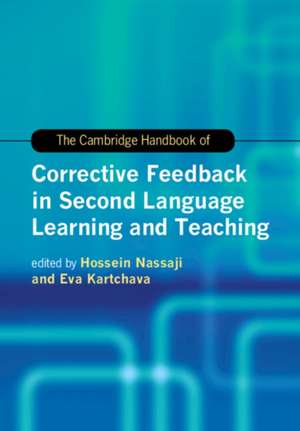The Cambridge Handbook of Corrective Feedback in Second Language Learning and Teaching: Cambridge Handbooks in Language and Linguistics
Editat de Eva Kartchava, Hossein Nassajien Limba Engleză Paperback – 13 iun 2024
| Toate formatele și edițiile | Preț | Express |
|---|---|---|
| Paperback (1) | 282.53 lei 6-8 săpt. | |
| Cambridge University Press – 13 iun 2024 | 282.53 lei 6-8 săpt. | |
| Hardback (1) | 982.81 lei 3-5 săpt. | |
| Cambridge University Press – 10 mar 2021 | 982.81 lei 3-5 săpt. |
Din seria Cambridge Handbooks in Language and Linguistics
-
 Preț: 257.36 lei
Preț: 257.36 lei -
 Preț: 419.59 lei
Preț: 419.59 lei -
 Preț: 282.02 lei
Preț: 282.02 lei - 14%
 Preț: 989.27 lei
Preț: 989.27 lei - 23%
 Preț: 982.81 lei
Preț: 982.81 lei -
 Preț: 421.83 lei
Preț: 421.83 lei -
 Preț: 284.81 lei
Preț: 284.81 lei -
 Preț: 338.63 lei
Preț: 338.63 lei -
 Preț: 297.50 lei
Preț: 297.50 lei -
 Preț: 280.50 lei
Preț: 280.50 lei -
 Preț: 285.18 lei
Preț: 285.18 lei -
 Preț: 284.94 lei
Preț: 284.94 lei -
 Preț: 281.54 lei
Preț: 281.54 lei -
 Preț: 280.68 lei
Preț: 280.68 lei - 19%
 Preț: 495.90 lei
Preț: 495.90 lei -
 Preț: 417.90 lei
Preț: 417.90 lei - 14%
 Preț: 880.33 lei
Preț: 880.33 lei -
 Preț: 419.23 lei
Preț: 419.23 lei -
 Preț: 315.15 lei
Preț: 315.15 lei - 23%
 Preț: 977.84 lei
Preț: 977.84 lei - 23%
 Preț: 1493.38 lei
Preț: 1493.38 lei -
 Preț: 419.93 lei
Preț: 419.93 lei - 19%
 Preț: 451.06 lei
Preț: 451.06 lei - 23%
 Preț: 949.77 lei
Preț: 949.77 lei - 23%
 Preț: 1066.00 lei
Preț: 1066.00 lei - 14%
 Preț: 989.06 lei
Preț: 989.06 lei -
 Preț: 347.32 lei
Preț: 347.32 lei -
 Preț: 370.92 lei
Preț: 370.92 lei - 23%
 Preț: 1075.01 lei
Preț: 1075.01 lei - 23%
 Preț: 1023.97 lei
Preț: 1023.97 lei - 11%
 Preț: 507.18 lei
Preț: 507.18 lei - 23%
 Preț: 753.13 lei
Preț: 753.13 lei -
 Preț: 473.75 lei
Preț: 473.75 lei -
 Preț: 468.73 lei
Preț: 468.73 lei - 23%
 Preț: 1027.19 lei
Preț: 1027.19 lei -
 Preț: 398.99 lei
Preț: 398.99 lei -
 Preț: 398.39 lei
Preț: 398.39 lei
Preț: 282.53 lei
Nou
Puncte Express: 424
Preț estimativ în valută:
54.07€ • 56.24$ • 44.64£
54.07€ • 56.24$ • 44.64£
Carte tipărită la comandă
Livrare economică 15-29 aprilie
Preluare comenzi: 021 569.72.76
Specificații
ISBN-13: 9781108450577
ISBN-10: 1108450571
Pagini: 824
Dimensiuni: 170 x 244 x 44 mm
Greutate: 1.29 kg
Editura: Cambridge University Press
Seria Cambridge Handbooks in Language and Linguistics
ISBN-10: 1108450571
Pagini: 824
Dimensiuni: 170 x 244 x 44 mm
Greutate: 1.29 kg
Editura: Cambridge University Press
Seria Cambridge Handbooks in Language and Linguistics
Cuprins
Introduction. Corrective feedback in second language teaching and learning Hossein Nassaji and Eva Kartchava; Part I. Theoretical Perspectives on Corrective Feedback: 1. Corrective feedback from behaviorist and innatist perspectives ZhaoHong Han; 2. Interactionist approach to corrective feedback in second language acquisition Rebekha Abbuhl; 3. Cognitive theoretical perspectives of corrective feedback Ronald Leow and Meagan Driver; 4. Corrective feedback from a sociocultural perspective Hossein Nassaji; Part II. Methodological Approaches in the Study of Corrective Feedback: 5. Tools to measure the effectiveness of feedback Alison Mackey, Lara Bryfonski, Özgür Parlak, Ashleigh Pipes, Ayşenur Sağdıç and Bo-Ram Suh; 6. Laboratory-based oral corrective feedback Shawn Loewen and Susan M. Gass; 7. Classroom-based research in corrective feedback Antonella Valeo; 8. Meta-analysis and research synthesis Daniel Brown; Part III. Different Delivery Modes of Corrective Feedback: 9. Oral corrective feedback Rhonda Oliver and Rebecca Adams; 10. Written corrective feedback John Bitchener; 11. Technology-mediated corrective feedback Trude Heift, Phuong Nguyen and Volker Hegelheimer; 12. Gestures, corrective feedback, and second language development Kimi Nakatsukasa; Part IV. Feedback Provider, Feedback Focus, and Feedback Timing: 13. Peer feedback in second language oral interaction Noriko Iwashita and Phung Dao; 14. Focused versus unfocused corrective feedback Catherine van Beuningen; 15. Corrective feedback timing and second language grammatical development: research, theory, and practice Paul Gregory Quinn; 16. Explicit versus implicit oral corrective feedback Rod Ellis; Part V. Corrective Feedback and Language Skills: 17. Corrective feedback and the development of second language grammar Helen Basturkmen and Mengxia Fu; 18. Corrective feedback and the development of second language vocabulary Nobuhiro Kamiya and Tatsuya Nakata; 19. Effects of corrective feedback on second language pronunciation development Kazuya Saito; 20. Corrective feedback in instructional pragmatics Kathleen Bardovi-Harlig and Yucel Yilmaz; 21. Alphabetic print literacy level and the noticing of oral corrective feedback in SLA Elaine Tarone; Part VI. Contexts of Corrective Feedback and their Effects: 22. Corrective feedback in second versus foreign language contexts Maria de Pilar Garcia Mayo and Ruth Milla; 23. Corrective feedback in computer-mediated versus face-to-face environments Luis Cerezo; 24. Corrective feedback in mobile technology-mediated contexts Eva Kartchava and Hossein Nassaji; 25. Corrective feedback in content-based contexts Susan Ballinger; Part VII. Learners' and Teachers' Feedback Perspectives and Preferences: 26. Teacher and student beliefs and perspectives towards corrective feedback YouJin Kim and Tamanna Mostafa; 27. Written corrective feedback and learners' objects, beliefs and emotions Neomy Storch; 28. The role of training in feedback provision and effectiveness Eva Kartchava; 29. Perceptions and noticing of corrective feedback Reiko Yoshida; Part VIII. Individual Differences, Tasks, and Other Language and Learner-Related Factors: 30. Age and corrective feedback Alyssa Vuono and Shaofeng Li; 31. Gender effects Rebecca Adams and Lauren Ross-Feldman; 32. Feedback, aptitude, and multilingualism Beatriz Lado and Cristina Sanz; 33. Corrective feedback and affect Jaemyung Goo and Takaaki Takeuchi; 34. Corrective feedback, developmental readiness and language proficiency Miroslaw Pawlak; 35. Corrective feedback and grammatical complexity: a research synthesis Gisela Granena and Yucel Yilmaz; 36. The role of task in the efficacy of corrective feedback Pauline Foster and Martyn McGettigan.
